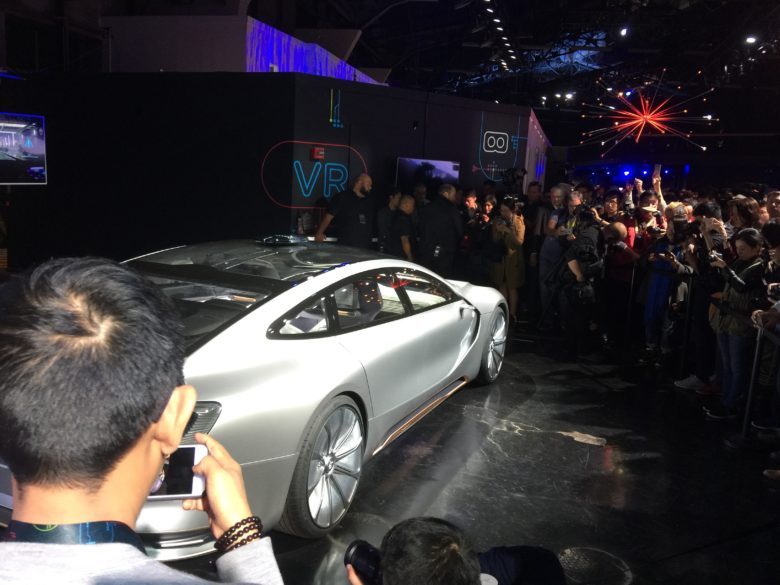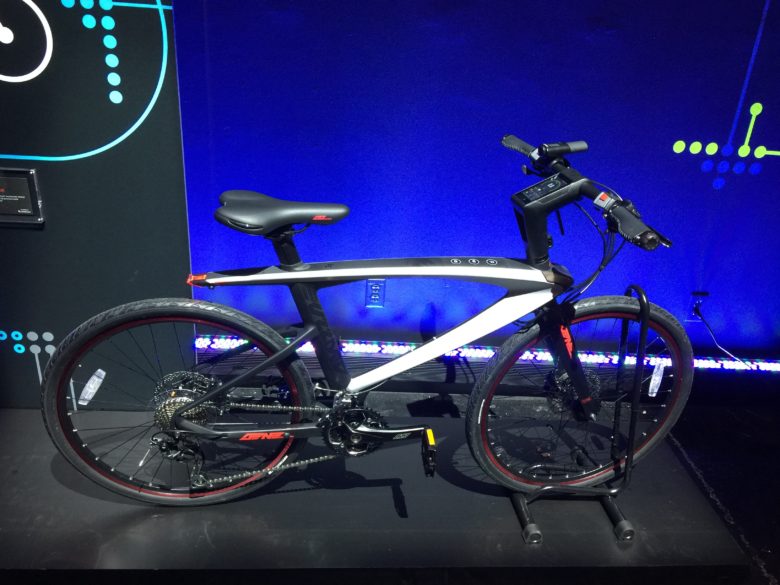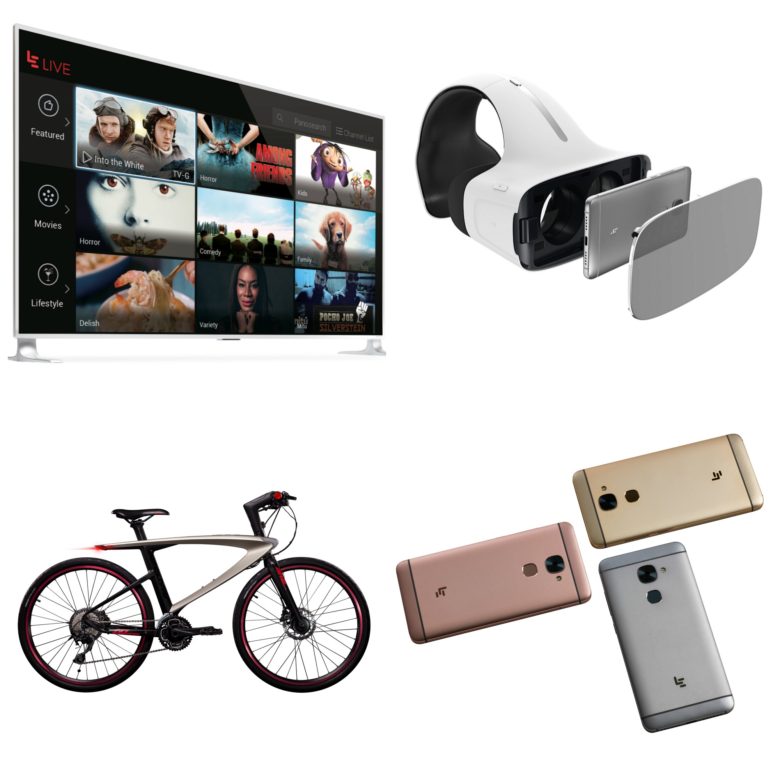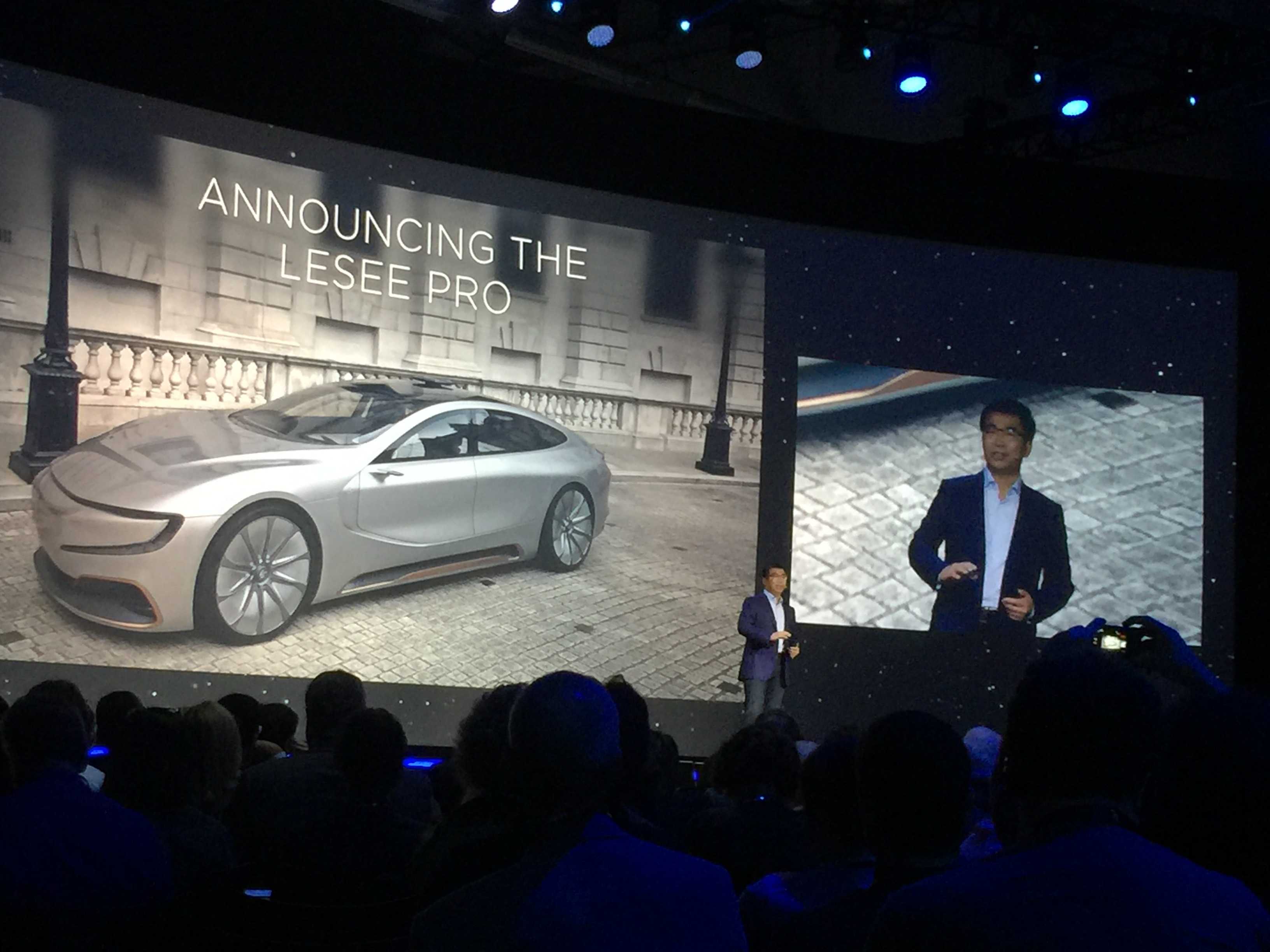SAN FRANCISCO — Apple does things one way. LeEco chooses a radically different path — in fact, you might call it the Anti-Apple.
What, you’ve never heard of LeEco, the Chinese company with the French-sounding name that’s gunning for American millenials?
After a big, splashy press conference on Wednesday that unveiled a raft of Android-based products, you’re about to hear a lot about LeEco, which calls itself “the best-kept secret in tech.” And if you’re working for Cupertino, you might be getting a little bit anxious as LeEco storms into the U.S. market.
LeEco made a big splash here Wednesday as it unveiled its new line of Android-based smartphones and connected Android TVs to a gigantic throng of tech journalists. During a nearly two-hour presentation, the company’s execs laid out a bold vision for weaving LeEco’s technology into the fabric of our everyday lives.
Like Apple, LeEco makes smartphones and talks a lot about its prized ecosystem. But that’s where the similarities end. LeEco is young, ambitious and unafraid to take on all comers in a wide variety of product categories.
And it’s got an autonomous car!
Here are seven more ways LeEco is the Anti-Apple.
LeEco is an underdog
LeEco might be “the Netflix of China,” but to most Americans the company remains a virtual unknown. You might not even know how to pronounce the company’s name. (I didn’t until today — it’s a long “e” as in “ecosystem,” BTW.)
Apple, on the other hand … is Apple. It’s one of the biggest companies and most valuable brands in the world. It builds and delivers high hardware and software beloved around the world.
For years, analysts and Apple fans alike have been calling into question Cupertino’s ability to innovate and its thirst for coming up with the “next big thing.” Maybe that’s just a consequence of a mature company based firmly in reality.
LeEco clearly possesses an underdog’s hunger for success and an upstart’s zest for big ideas. Who knows if it can pull off its lofty plans — for now, the ambition alone will generate attention.
LeEco practices ‘disruptive pricing’

Photo: LeEco
Unlike Apple, LeEco embraces the so-called race to the bottom when it comes to pricing. Rather than squeezing maximum profit from each device, the company focuses on “price to value,” according to Danny Bowman, chief revenue officer at LeEco Holdings North America.
During Wednesday’s presentation, he took a shot at Apple, Samsung and other sellers of high-end smartphones. “Why pay $650 or more for the so-called smartphones of today?” he asked, before rolling out LeEco’s new flagship phone, the Le Pro 3.
While the Le Pro 3 sports pretty impressive specs, including a speedy Qualcomm Snapdragon 821 chip, the most jaw-dropping thing about it might be its price. It retails for $399, and LeEco will give you a $100 instant rebate if you sign up for its free LeRewards membership program in November.
It’s an unheard-of price point for a flagship device. And then there’s LeEco’s new entry-level phone, the Le S3 Ecophone. It will sell for $249, or $149 with the $100 instant rebate at launch.
Also Wednesday, the company unveiled an 85-inch smart 4K TV called the uMax85. It will sell for $4,999 (with $1,000 off at launch). For the time being, all these items will be for sale only through LeEco’s website.
LeEco is entering the U.S., not China

Photo: Lewis Wallace/Cult of Mac
Apple makes a lot of noise about the importance of the Chinese market, where it boasts a substantial foothold. LeEco sells millions of smartphones there, too, but it’s looking at the United States as its “most important global market,” LeEco chairman, CEO and founder Jia Yueting said Wednesday.
With its pair of new phones, as well as its LeMall online store, where it will peddle its new phones and other electronics, the company is feverishly pursuing its goal of bringing its disruptive model to the United States, Jia said.
LeEco touts an open ecosystem, not closed
LeEco says it’s delivering “the world’s first open-loop complete ecosystem.” Its phones, TVs and bicycles (and eventually its cars) all work on LeEco’s EUI platform.
“EUI is the connective tissue that binds our ecosystem together,” said Kenny Mathers, LeEco’s general manager of global product marketing, during a discussion about the company’s new phones after the main presentation.
Despite all the talk about the benefits of an open ecosystem, EUI (which is built on Android) actually doesn’t sound that different from Apple’s famously closed ecosystem. The main goal is the same: Make products that work together seamlessly.
However, LeEco also spent a lot of time talking about its UP2U program, which is a basically a distributed user feedback system with a catchy name. LeEco repeatedly said it takes users’ comments about design and features very seriously, allowing the company to produce upgrades that users actually want.
It communicates with users through online forums as well as “channels” on its devices, and the company even hands out upcoming devices to users so they can provide feedback and help make the products better.
Can you imagine Jony Ive coughing up an early version of the iPhone 8 to get some design pointers? No, you can’t (although maybe some user input on the disappearing headphone jack or the Apple Music interface might have been nice).
LeEco is not afraid of a very public moonshot
While Apple is notoriously secretive, LeEco isn’t afraid to put its cards on the table.
Like Babe Ruth pointing at the bleachers before swinging for the fences, LeEco told the world in 2014 that it would get into the electric vehicle race. Two years later, it rolled out its LeSEE autonomous concept car at the Beijing Auto Show.
LeEco’s strategic partnerships with automakers Faraday Future and Aston Martin, and its recent raising of $1.08 billion in venture capital, would seem to indicate that the company is serious about putting an actual autonomous car on the road.
Apple, meanwhile, reportedly doesn’t know exactly what it wants (if anything) when it comes to its stalled-out electric vehicle project — the company won’t even admit it’s dabbling in the space, despite the fact that Elon Musk called it an open secret in Silicon Valley.
LeEco gets things done quickly

Photo: Lewis Wallace/Cult of Mac
LeEco built its fortune as a streaming video company, but its rapid expansion into other categories makes Apple look glacial. Recently, Cupertino can’t seem to get anything done quickly.
Efforts to put together Apple’s long-rumored “slim bundle” a la carte TV offering reportedly imploded due to hardline negotiating tactics. We’ve waited years for Mac upgrades (which are reportedly coming next week).
Ambitious Apple platforms like HomeKit and HealthKit sounded great at 2014’s Worldwide Developers Conference keynote, but they don’t seem to be bearing much fruit as of yet. And then there’s the “secret” Apple Car project, which may or may not ever amount to anything.
Compare that to LeEco’s quick evolution from a streaming video company founded in 2004 to a maker of smartphones, smart TVs, VR headsets and other electronics, plus connected “super bikes” and an autonomous vehicle.
The privately held company, with revenues of $1.6 billion in 2014, has been busy hammering out Hollywood deals to fuel its streaming EchoPass video service. While short on details about pricing or exactly what EchoPass will entail, LeEco promised to reveal a major new content partner on Nov. 2, the day it begins selling its new phones and TVs in the U.S. market.
It’s far too early to tell if LeEco will be able to turn its lofty ambitions into global success — the company has thrown down the gauntlet and challenged Apple, Google, Amazon, Netflix, Samsung, Oculus, Tesla and Uber. But LeEco’s naked ambition and aggressive pursuit of high-profile new projects should earn it a certain level of admiration.
LeEco lives in a sci-fi future

Photos: LeEco
Perhaps the most tantalizing aspect of LeEco’s presentation in San Francisco was its bold embrace of the future. A flashy promo video laying out a vision of how we will live with LeEco products played like one of those scene-setting voiceovers you see in sci-fi movies.
In contrast, Apple’s slickly produced promo videos seem firmly rooted in the here and now. They explain how Apple Music works (too bad it needs a tutorial) or dive into the latest production method devised by Jony Ive and his crew. They tend to toy with emotions rather than radically reimagine the future.
In two days, my Eco World vision will become a reality in the U.S. https://t.co/usWWAsVoBC #LeNext
— YT Jia (@JiaYueting) October 17, 2016
At its iPhone 7 event last month, Apple delivered an impressive array of updates to existing products: a faster smartphone, a more powerful Apple Watch. It also killed off the headphone jack (something LeEco already did, when it embraced USB-C for its smartphones). And Apple revealed its new wireless AirPods, which are “coming soon.”
That’s all well and good. I’m legitimately thrilled that Apple keeps improving the products in its ecosystem, and the iPhone 7 keynote came off as polished and powerful in a 2016 kind of way.
But when it comes to a forward-looking message, LeEco leaves Apple in the lurch. A smart bike? Advanced phones at dirt-cheap prices? An all-encompassing entertainment ecosystem that promises to let you watch what you want, when you want, whenever you want, even in your self-driving car?
Will LeEco succeed?
I’m a skeptic at heart. I appreciate Apple’s real-world accomplishments and realize we might never experience some of LeEco’s most ambitious dreams, whether due to technological limitations or government regulation. But I also love sci-fi and admire dreamers like Elon Musk, Richard Branson and, yes, Steve Jobs who seem hell-bent on pushing us into the future.
“My personal philosophy,” writes LeEco’s CEO, “is that if you dare to dream what 99 percent of the world believes is impossible, you’ve earned the right at that 1 percent chance to be successful.”
It’s no coincidence that Jia’s philosophy got repeated over and over during Wednesday’s presentation. LeEco is not afraid to gamble on the future.
Will LeEco succeed and win the future? Only time will tell if its splashy approach will make a dent in Apple’s universe. But for now, I’m paying attention.


